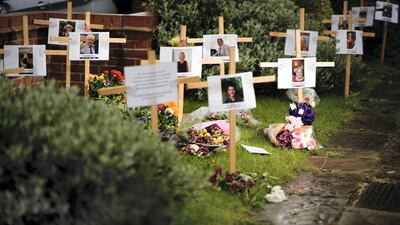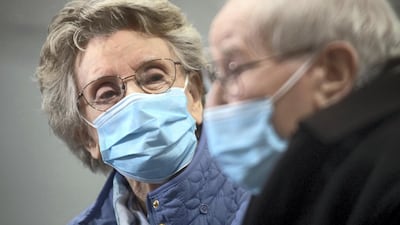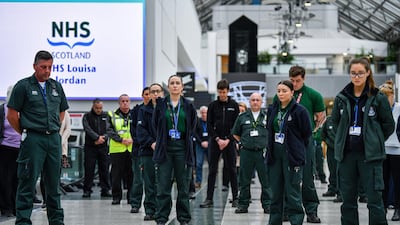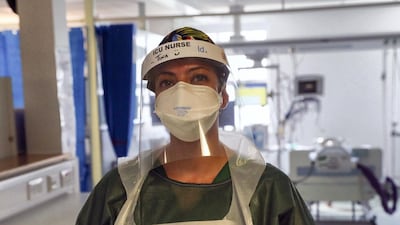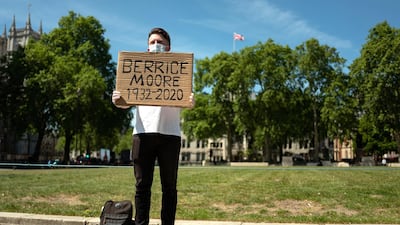The detrimentally named "UK strain" and the government's handling of the Covid-19 crisis damaged Britain's reputation, experts said.
With the highest death count in Europe and families devastated by the debilitating illness, the country’s standing on the international stage also suffered, they suggested.
A new survey of 4,000 respondents found that the government’s chaotic response to the outbreak had created negative opinions about the UK’s ability to handle a crisis, harming its national reputation abroad.
Health Secretary Matt Hancock on Tuesday lamented that the UK’s identification of a new variant of the virus, found in Kent in southern England and dubbed "the UK strain", had effectively penalised the country, by forcing others to shut their borders to British travellers.
Mr Hancock's remarks came on the day Britain's coronavirus death toll passed 100,000, the fifth highest in the world, giving ammunition to those who believe the UK, at least so far, has failed to adequately handle the pandemic.
On top of that, a dispute broke out between UK pharmaceutical company AstraZeneca and the EU after vaccine supplies were cut.
That led to calls for the EU to restrict exports of the vaccine and to the suggestion that Britain may be trying to unfairly hold on to doses made within its borders.
The UK’s vaccine stockpile was unaffected by the move, prompting concern in the EU that pharmaceutical companies were giving priority to higher bidders outside the bloc.
It added to the impression that Britain was no longer playing fairly after failing to deal with the crisis.
The survey of 53 countries, conducted by strategists Bloom Consulting, suggested the UK’s reputation had had been damaged.
It ranked the UK as among those suffering the most reputational damage from its pandemic response, ahead of other hard-hit countries including Spain, Italy and the US.
South Korea, Germany and Singapore were deemed “the winners of the crisis”, emerging with stronger reputations after their response to the first wave of the virus, the study said.
Malcolm Allan, president of Bloom Consulting, said the results of the survey should cause concern.

"There is too much dislike of what the Westminster government has done," he told The National.
Mr Allan said that Downing Street’s response was generally regarded by survey respondents as chaotic.
“I think the tourists will eventually come back, but the response is damaging in terms of inter-government relations and how the international press are reporting us, which could affect investment in the UK,” he said.
Mr Allan said the "UK variant" title for the strain found in Britain would also harm the country’s reputation.
He likened the name to Donald Trump’s labelling of Covid-19 as the “China virus” during his term as US president.
“It’s not helpful for international relations," Mr Allan said. "There is a negative association with these labels that somehow it is someone else’s fault."
Mr Hancock acknowledged that the UK's advanced genome sequencing capabilities had brought inevitable consequences, such as border closures after scientists identified the new strain.
“Obviously it’s incredibly important we share transparently all that’s going on with our response to Covid and other communicable diseases,” Mr Hancock told Chatham House, a London independent policy institute.
“But there’s a paradox here: the countries that have spotted and sequenced new variants of concern then understandably cause reactions from their neighbours around the world.
"But it is still the right thing to do to protect life."
Sharon Peacock, chair of the Covid-19 Genomics UK Consortium, said many of the Covid-19 variants may not have emerged in the countries they were first discovered.
She said Britain is sequencing more virus genomes than anywhere else, therefore many future variants might be discovered in the UK, even if they came from somewhere else.
"The more you sequence, the more you find," she told The Washington Post. "First detected doesn't mean first emergent."
The World Health Organisation said last week that it was planning a new naming system without reference to countries.
The technical name for the variant first identified in Britain is B117.
“It’s really important that when people call it the ‘UK variant’ or ‘South African variant’ that we aren’t assigning values to these countries,” said the WHO's emergencies director, Mike Ryan.
"These countries aren’t the cause of this problem."
Mr Ryan said the UK should be “commended and lauded” for identifying the new strain.
